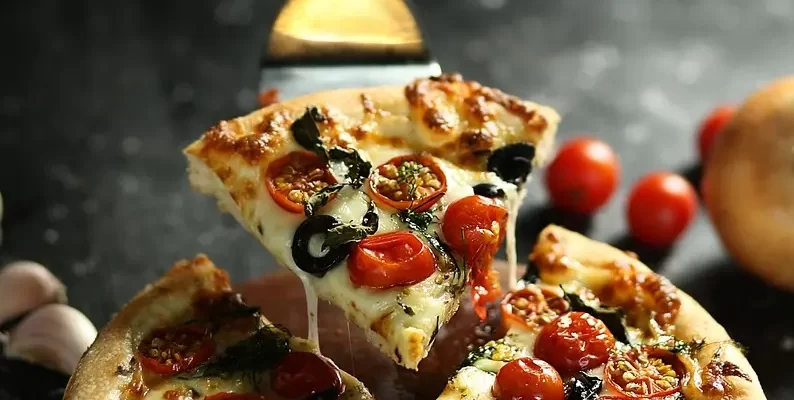It’s undeniable that pizza holds a top spot as a universally loved food. The savory layer of cheese, the tangy sauce, and the warmth of freshly baked dough are inviting to people of all ages and genders. However, continuous indulgence in this mouthwatering dish could lead to various adverse effects on health, which may vary by gender and age.
Side Effects in Men
Men often get together for a round of games paired with pizza. However, their health might be silently bearing the brunt of this tradition. Here’s how:
- Weight Gain: An average slice of pizza houses an alarming amount of calories. This excessive caloric consumption can lead to significant weight gain in men if not balanced with regular exercise and a wholesome nutrition.
- Heart Problem: The high saturated fats and salts in pizza can contribute to high blood pressure, increasing the risk of heart diseases over time.
- Indigestion: For older men, regular consumption of pizza could lead to persistent indigestion due to its cheesy richness and high fat content.
Side Effects in Women

Irrespective of age, women eating pizza regularly might encounter:
- Unhealthy Skin: The excess oils in pizza could lead to an outbreak of acne.
- Weight Gain: Like men, women also face the possibility of weight gain due to the high caloric content.
- Bone Thinning: Post-menopause, women are at a higher risk of developing osteoporosis. The excessive sodium content in pizzas can hasten calcium loss, causing bone thinning.
Side Effects in Children and Teenagers
Children and teens love pizza, but eating too much can harm their growing bodies.
- Obesity: Due to the high calorie and fat content, regular intake of pizza contributes to childhood and teen obesity.
- Learning and Behavior Issues: Some research suggests that eating junk food like pizza might adversely affect learning abilities and behavior in children due to lack of essential nutrients.
- Dental Issues: The high levels of sugar in pizza sauce can lead to increased instances of cavities and gum disease if dental hygiene is not maintained.
This breakdown provides a snapshot into how side effects of eating pizza differ by gender and age. Moderation and balance are key – enjoying pizza as part of a balanced diet can help mitigate these side effects.
FAQ
Question 1: Is pizza unhealthy or healthy?
Answer: Pizza is a convenient and delicious choice for a meal; however, it is crucial to make thoughtful decisions when it comes to choosing your pizza. The healthiness of a pizza primarily depends on the ingredients used and how it is prepared. Pizzas that contain processed meats, excessive cheese, and fatty toppings are generally less healthy. Instead, selecting pizzas that include fresh veggies, whole grain crust, and lean proteins can make it a healthier alternative.

Question 2: Will 2 slices of pizza ruin my diet?
Answer: Enjoying 2 slices of pizza once a week as a treat is generally not going to ruin your diet. The key to maintaining a healthy diet is moderation and balance. If you are eating a balanced diet for the rest of the week and incorporating regular exercise, indulging in a couple of slices of pizza should not have a significant impact on your overall health or weight.
Question 3: How long is too long to eat pizza?
Answer: Pizza, like any other perishable food, has a shelf life. Leftover pizza should be stored in the refrigerator and consumed within 3-4 days. Beyond that, it is advisable to discard it. It’s always a good practice to check the appearance and smell of the pizza before consuming it, as these are indicators of spoilage.
Question 4: Is it good to walk after eating pizza?
Answer: Taking a short walk after eating pizza or any meal can aid digestion and help prevent discomfort such as bloating or indigestion. Walking helps stimulate the digestive system and promotes the absorption of nutrients. However, there is no hard-and-fast rule that specifically applies to pizza consumption, so listen to your body and do what feels comfortable for you.
Question 5: Which pizza is healthiest?
Answer: When it comes to choosing a healthier pizza option, consider pizzas with whole grain or cauliflower crusts and toppings that include vegetables, lean proteins like chicken or fish, and lighter cheeses. Avoid high-fat processed meats, excessive amounts of cheese, and deep-fried crusts. Customizing your pizza with healthier choices can make it a more nutritious meal.
Question 6: Can I eat pizza if I workout?
Answer: Pizza can be a source of carbohydrates, proteins, and fats, which are all essential macronutrients for post-workout recovery. However, it’s important to be mindful of portion sizes and the overall nutritional content of the pizza. If you choose a healthier, balanced pizza option and factor it into your daily calorie and macro requirements, it can still be enjoyed as an occasional post-workout meal.
Question 7: Is it okay to eat pizza late in the day?
Answer: It is generally fine to eat pizza late in the day as long as it fits within your overall daily calorie and macronutrient intake. However, consuming heavy meals close to bedtime may lead to discomfort during sleep and may affect digestion. It is advisable to eat lighter meals in the evening and allow a couple of hours for digestion before going to bed.









